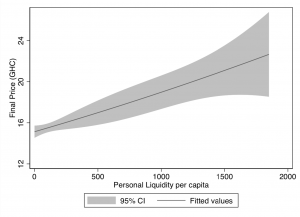This summer, I worked with Professor Gisella Kagy from the Economics Department and explored women empowerment & micro-enterprises in Sub-Saharan Africa.
During the first week, I looked at some survey data of about 840 women working in manufacturing in Addis Ababa, Ethiopia.
For the majority of the project, I worked on another paper that explored the bargaining behavior of clothing micro-enterprises in Hohoe, Ghana and the effects on those behaviors due to personal, household, and firm characteristics of the owners.
Numerous works of literature have used theoretical and experimental frameworks to analyze the bargaining pattern of micro-enterprises, but this paper is one of the first to document the relationship between personal, household, and firm characteristics and bargaining behavior. Using previous works and models, we predicted that the final transaction price would be correlated to how much accessible cash the seller had at the time of transaction.
To investigate this prediction, I cleaned the survey data and prepared it for analysis. There were two major things that I worked on: (a) cleaning the data to ensure consistency between the raw data and the cleaned data (b) handling observations missing values and finalizing all intermediate sample sizes that were used in summary statistics and regressions. The regressions that followed showed that personal liquidity per capita of the firm owner’s household could predict the final price of bargaining: firms with less accessible cash were seen to settle on a lower final price, and this was consistent with our model’s prediction of people with lower personal liquidity being more risk-averse.
Next, I explored the “Price Reasoning” data from the survey to see a pattern that could qualitatively suggest why the firm owners were settling on their individual final prices. These results can be important in understanding the implications of policies related to bargaining in developing countries.


